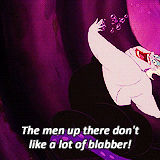hippity-hoppity-brigade:I only just realized that there’s a theme in a lot of Disney movies of young
hippity-hoppity-brigade:I only just realized that there’s a theme in a lot of Disney movies of young women being able to use their voices to be heard, and to go after their goals because of their ability to communicate. Here, Ursula is convincing Ariel to give up her voice. Obviously, no matter how you feel about the message of her speech here (I’m rolling my eyes and agreeing cynically), you have to acknowledge that whatever she says in this scene is a lie. But it’s actually the movie itself that reveals this speech to be a lie. Erik is looking for a girl with Ariel’s voice; later Ursula manages to entrap him by speaking and singing to him (in Ariel’s voice). Ursula is communicating with Erik, and that’s the clincher. No matter how pretty Ariel is, how Twilight-esque endearingly awkward and clumsy, Erik is drawn to the girl who can communicate with him. The same goes for some other Disney movies. A lot of old variations of Beauty and the Beast involve Belle settling for an unintelligent man; once she marries him, he becomes well-spoken and witty. In other words, the beast is actually a dumb guy. But Disney used the version of the story that gives Belle a way to fall in love through the trade of ideas and stories. Gaston is there to show the bigoted, uncommunicative suitor. Belle cannot communicate with him even when she tries. He’s closed to all thought beside his own. The Beast, on the other hand, literally allows Belle to invade his walls (his castle and his emotional defenses), with her love of words, reading, communicating. He gives her a library so she can be better equipped to share ideas, talk to him, etc. the library is a symbol of Belle’s strength in connecting to the Beast, just as Ariel’s voice was a way to connect with Erik. Love is made through the trade of ideas, the communication of dreams, and the acknowledgment of the other person’s words. Think about Pocahontas. As cheesy as the multi-colored magic language-changing leaves are, they’re a huge part of the reason Pocahontas changed her mind about the white invaders. (I hesitate to say “fell in love” because historical accuracy and all that.) Once they spoke the same language, she could communicate not only her wishes, but also her way of life and her culture. She could use her arguments as a weapon. Jasmine’s greatest strength is her voice. She explains to Aladdin how trapped she feels, and she breaks up an argument about her marriage by yelling that she is a person and can decide for herself. Jasime didn’t fall for Aladdin until it was revealed that he was her street rat. His lack of communication, his lies, were what held her back. Again, communication between two love interests is shown as essential. Snow White sing a wish that her “true love” would find her and take her away. Literally moments later, the prince appears and falls in love with her instantly. Snow White had power over her narrative by speaking her wishes aloud. Weirdly enough, she and Cinderella barely talk to their respective princes. Even so, simply communicating a wish aloud is powerful too; Merida and Tiana both change the course of their narratives by wishing aloud. They both also break spells by speaking: Tiana says “I do” and becomes a princess, and Merida vocally apologizes to her mother. It’s all about women using their voices to express what they want changed. Once they do that, so the movies tell us, then there’s a way for them to move forward toward that dream. These girls are going after what they want by communicating. Contrary to what Ursula says, women can use their voices to such amazing lengths. They can argue, fall in love, and save the day because they have the power to speak up. That’s a really awesome message. -- source link








